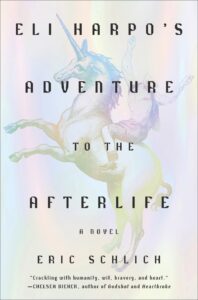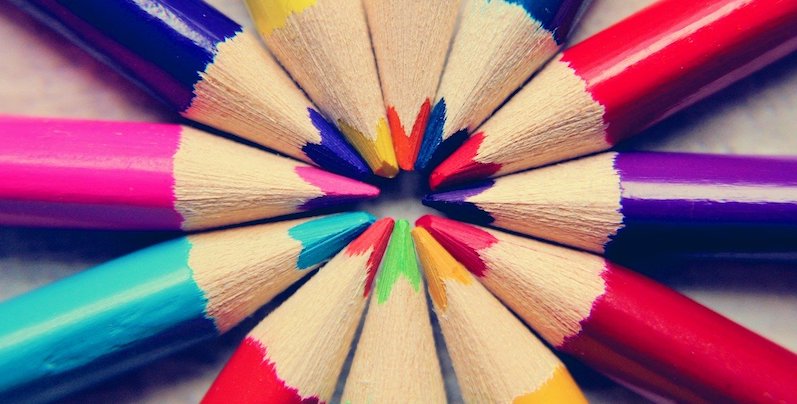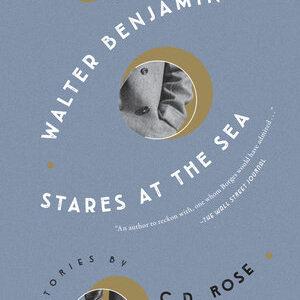Why I Write Gay: Eric Schlich Channels His Bisexuality Through Queer Protagonists
“I’m done thinking of that as cowardly. Because what it really was, was empowering.”
There’s a scene in my novel, Eli Harpo’s Adventure to the Afterlife, in which my teen protagonist, Eli, accompanies his terminally ill mother, Debbie, to what he believes to be a cancer support group. Spoiler alert: It’s not. It’s actually a PFLAG meeting—Parents and Friends of Lesbians and Gays—and Debbie, well-intentioned but naïve, takes Eli there without warning after having secretly witnessed him kiss a boy.
When Debbie asks for advice on how to help him come out, one of the PFLAG teens turns to a sullen, closeted Eli: “Wait. You mean you’re not—? You haven’t—? Oh, that’s fucked up.”
I wrote this scene having never been to a PFLAG meeting, having never been pressured to come out myself, much less in a church basement full of strangers (ouch), but I know exactly how Eli feels in that moment because I’m writing this essay.
I’m writing this essay, you see, because I’m being yanked out of the closet by my own book.
*
While reading a galley copy of Eli, one of my writer friends asked why I made Eli gay. There was no malice behind the question, but still, it felt like an accusation: Who are you to write a gay character? And my gut reaction was: Um… none of your fucking business! Why do you have to pry into my sexuality to form an opinion on a work of fiction?
Can you have imposter syndrome for your own sexuality?Then again, I get it. The #OwnVoices movement exists for a reason. The publishing industry needs to take a hard look at its systemic racism and increase the diversity of its output. This applies to LGBTQ and neurodiverse authors, too. It’s a complex issue with no easy solutions, and I acknowledge that I say this with the privilege of being a cis, neurotypical white man.
But at the same time, I get extremely squeamish when it comes to policing art by setting up boundaries around “authenticity.” Especially when it results in a climate of fear (re: appropriation) that silences authors writing characters unlike themselves.
Because isn’t that the whole point of fiction? To write outside yourself? It’s risky, perhaps even taboo now, to stray too far from your own identity. Mostly because you might do it poorly. Offensively. The rise of authenticity readers is a testament to that. Even so, I’m all for crossing such lines, especially when it comes with interrogating your own craft and the capacity (or limits) of your empathy.
A few weeks after that conversation, I was at a party and talking about researching actors for the novel’s audiobook. I’d been told it would be preferable if the narrator were gay, like my protagonist, and though this made sense to me, it sent me down an uncomfortable internet rabbit hole, looking up the romantic lives of strangers and asking questions like: Doesn’t it also matter if he’s Southern like my character, for the voice? What if he’s gay and Southern, but also Korean American? Or does he have to be white, too? Which lines of identity can be crossed in creation and representation and which are non-traversable?
“But why should his sexuality matter?” a friend said. “You wrote the book and you’re not gay…?”
There was an implied question mark at the end of that sentence. A pause yawned between us, an opening I might have filled but instead let hang there, then dissipate. I probably nodded. I might have even said, yeah, and changed the subject.
It was yet another failure for me to come out. But I knew it was only a matter of time. I’d soon have interviews. Readings. Q&As. These questions were sure to come up again. I imagined myself taking the witness stand: “The Defendant pleads not guilty to the charge of LGBTQ appropriation by reason of being a bisexual man. Although he is married to a woman and therefore passing as heterosexual, he’d like to have his same-sex attraction entered into the record as evidence.”
I hate that I have that impulse—to strip down the walls of privacy between me and the reader so I can be judged accurately. Not by the work itself, but by how it measures up against me as a person: Am I really coming out as bi as a defense for writing a gay character?
*
Straight Me: “I made Eli gay, because I wanted to include a subplot about his sexuality in concert with the book’s main plot, re: Eli’s doubts about whether or not he truly visited heaven. I cared about Eli’s romantic life in addition to his familial and it seemed like a natural way to “up the stakes,” as they say, since his Baptist minister father would be, at worst, homophobic and disown him or, at best, reluctantly forgiving of this “sin.” I was inspired by works like Garrard Conley’s Boy Erased and Emily M. Danforth’s The Miseducation of Cameron Post, about conversion therapy camps, and wanted to explore my own take on a boy coming out in a fundamentalist family.”
Gay Me: “I didn’t make Eli gay. Eli’s gay because he’s gay! He was, is, always will be gay gay gay!”
*
Sometimes I wonder if I was born into a later generation, if I’d have been brave enough to not only come out as bi, but also to actually date men. When I was in high school (class of ’06), “gay” was slang for “stupid” or “embarrassing.” I remember being very conscious about how I sat, because I was told that crossing my legs was “gay.” W. was president and my conservative classmates viewed gay marriage was viewed as a legitimate attack on “family values.” They wrote essays about it in which the Bible was cited as a source. No wonder I defaulted into heterosexuality. It was the path of least resistance.
But my queer self was always there, buried. When I was a child I was so obsessed with The Wizard of Oz, I used to dress up in my mom’s red high heels and an orange Moonlight Madness t-shirt, a freebie from McAlpin’s, the department store where she worked as a buyer. For a long time, I found photos of me in this outfit mortifying. Now they make me wistful: I was so free to be whoever I wanted to be! There is something so painful to me about the purity of the self before it is corrupted by contact with the social world.
Later, there was performative masculinity, performative heterosexuality. I hated sports, but when I was ten and my family moved houses I got to choose wallpaper for my new bedroom and I chose a border that featured basketballs, soccer balls, a skateboard. This choice couldn’t have been further from the interests of the shy, unathletic bibliophile I was turning into. I wrote a list of “Girls I Like” on a Post-It and hid it in my room. I actually did like these girls, but you’d never see a comparable list of “Boys I Like,” because I didn’t have a crush on that popular snare drummer in the band—I just wanted to be him. Or be friends with him. Right?
I had a vivid romantic life in my fantasies, but dating-wise, I was a late bloomer. I met my first girlfriend in grad school. And then I married her. I might regret not being brave enough to be more sexually adventurous in my youth, but I don’t regret marrying my wife—my life partner, the mother of my son, my best friend. We’ve made a wonderful life together. But this also means I’ve closed off a piece of myself. I’ve stunted the gay teenager inside of me, locked him in the closet of my mind and heart.
But he’s still there. He comes out through the fiction I consume and create.
*
I feel my queerness most acutely when I watch teeny bopper movies and TV shows with gay protagonists. I get emotional watching, even when they’re geared toward a younger audience and are so cheesy they’re bordering on cringe. When Simon, of Love, Simon (2018), discovers the identity of the mysterious Blue and they share their first kiss on the Ferris Wheel. When Alex Strangelove, of Alex Strangelove (2018), contemplates his sexuality via the metaphor of cereal brands: “Heter-Os,” “Gay-Flakes,” or “Bi-Crunchies”? I get to vicariously experience what coming out to my mother would have felt like as a teen when Heartstopper’s Kit Connor tells Olivia Coleman (who doesn’t want Olivia Coleman to be their mom?) he’s bi.
These coming-out narratives were all released when I was in my 30s. The hit gay movie of my own teen years? Brokeback Mountain (2005). I loved Ang Lee’s film (and Annie Proulx’s story on which it’s based) and was upset when Crash won the Oscar over it. But really? A tragic tale about the doomed loved of two cowboys? That was my model for gay love?
And there were even fewer models of bisexuality. The first TV show I watched featuring a bisexual man was also in grad school. It was an episode of Ally McBeal I was watching with my then-girlfriend, now-wife, called “Pursuit of Loneliness,” in which Ally rejects a guy after learning he’s bisexual. Even after being called on it, Ally doubles down after the image of him in bed with another man intrudes upon her strictly hetero fantasies. This was particularly hard to watch with my future wife, since she was the only person to whom I’d openly confessed my own attraction to both women and men.
It’s time to forgive myself for passing straight and finally embrace all sides of who I am.I didn’t watch Ally McBeal when it originally aired, but I did watch Friends. When I re-watched it during the pandemic lockdown, I re-discovered the episode called “The One Where Nana Dies Twice,” which might as well have been titled “The One in Which Chandler Has a Gay Quality.” Chandler’s co-worker mistakenly tries to set him up with a man and the friends reveal they all previously thought Chandler was gay, too, because he has a certain “quality” about him.
I remember watching this growing up and thinking, that’s me. I’m straight, but sensitive, which some people read as effeminate, that’s all. I liked to think this made me evolved. But in Kentucky in the nineties and early aughts, that “quality” was mostly considered a defect. It was unsettling, to be pegged so easily for something you thought you could hide, something you hid even from yourself, like I was giving off gay sonar—gaynar, tripping off everyone’s gaydar—that I wasn’t in control of.
*
When I first started writing, the idea of writing about myself held no appeal. My life, I felt—still feel—is boring. I grew up reading and watching fantasy, sci-fi, horror. Give me a wizarding school. A time-traveling island. An end-of-episode plot twist.
But when I tried my own attempts at the fantastical, the characters came out flat. It was like playing with paper dolls. My imagination was engaged, but the emotional heart wasn’t there. So I tried to flip this and wrote thinly veiled autofiction. I wrote about a little boy obsessed with the Wizard of Oz, who cross-dressed with his mom’s red pumps (“Not Nobody, Not Nohow”).
I wrote about Marcus, a closeted bisexual man who joins a marriage study with his wife (“Lipless”), after I, a closeted bisexual man, joined a marriage study with my wife. These stories brought personal vulnerability to the page, but they were…less fun to write. It was when I married the two strategies in a story like “Quantum Convention,” about Colin, a man meeting his multiple selves (including one in drag) at a parallel universe conference, that I found the sweet spot. A story premise that engaged my imagination and drew on my own vulnerabilities—in this case about my career choice and anxiety about having children.
And then came Eli. He was, as others seemed to intuit, a way for me to vicariously live out the parallel life of my inner stunted gay teen—not on screen in someone else’s fictional reality, but on the page in my own.
*
Straight Me: There’s a rainbow unicorn on the cover? This is the gayest cover ever.
Gay Me: There’s a rainbow unicorn on the cover! This is the gayest cover ever!!!
*
Being bi is confusing. It often feels like there are two teams: Team Gay or Team Straight. Pick one. Coming out is hard for me not just because of the shame of internalized homophobia (although I’m sure that’s a big part of it), but because I’ve never been sure if I can claim a queer identity based on attraction alone.
In fiction, nothing conveys character like action. You are what you do. And I’ve lived a straight life; I’ve made straight choices. Can you have imposter syndrome for your own sexuality? Because it often feels like I don’t have my gay credentials. But I’m sick of feeling that way.
If the worst version of this essay is me on the defense stand, maybe the best is a pride party. I do up the house in rainbow bunting. Buy a rainbow unicorn cake. Blast Diana Ross’s “I’m Coming Out.” I’ll invite everyone I’ve ever known over. Everyone I’ve never known, too. But the real guests of honor are those who helped me come out to myself first. Colin, Marcus, Eli. The Boy in Red Shoes.
The masks I’ve donned to write stories truer than the one I’ve made of my own life. I wrote about gay and bisexual characters, because it felt safe to do so in fiction. “Not me!” I could say. “Just my character.” I’m done thinking of that as cowardly. Because what it really was, was empowering. It gave me the chance to be myself by being someone else.
And now it gives me the courage to own my bisexuality, even though I’m married to a woman and never been with a man. It’s time to forgive myself for passing straight and finally embrace all sides of who I am. So come on over. Let’s party.
__________________________________

Eli Harpo’s Adventure to the Afterlife by Eric Schlich is available from Abrams Books.




















